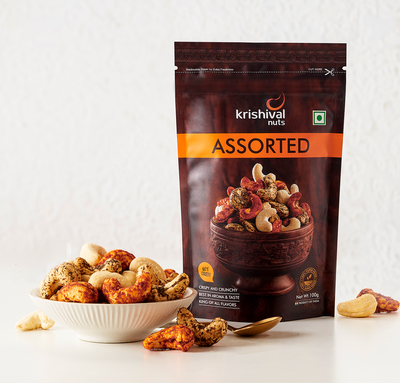
Table of content
- Are Dates Safe for Dogs?
- Nutritional Benefits of Dates for Dogs
- Potential Risks of Feeding Dates to Dogs
- How to Safely Feed Dates to Your Dog
- Healthy Alternatives to Dates for Dogs
- Most Asked Question
As pet owners, we often find ourselves sharing our favorite snacks with our furry friends. One treat that frequently comes up is dates—those sweet, chewy fruits that are packed with nutrients. But are they safe for dogs? In this article, we'll explore the safety and benefits of dates for dogs, as well as how to serve them properly. At Crave by Leena, we are dedicated to providing delicious and healthy treats for your pets, ensuring that they can enjoy tasty snacks without compromising their health.
1. Are Dates Safe for Dogs?
Yes, dogs can eat dates in moderation. Dates are not toxic to dogs, but they should be treated as an occasional snack rather than a regular part of their diet. While dates contain beneficial nutrients, their high sugar content can lead to health issues if consumed excessively. Always introduce new foods gradually and monitor your dog for any adverse reactions.
Shop Related Products
Key Safety Considerations:
- Non-Toxic: Dates do not contain any compounds that are harmful to dogs.
- Moderation is Key: Due to their high sugar content, it's important to limit the number of dates you give your dog.
- Monitor for Reactions: Always watch for signs of food intolerance, such as vomiting or diarrhea, after introducing dates.
Additional Notes:
- Consult Your Vet: If you have any concerns about your dog's diet, it's always best to consult your veterinarian before introducing new foods.
- Age and Size Considerations: Puppies and smaller breeds may be more sensitive to new foods, so start with even smaller portions.
2. Nutritional Benefits of Dates for Dogs
Dates are rich in essential nutrients that can benefit your dog's health. They contain:
- Vitamins: Dates are a good source of vitamins A, B6, and C, which support overall health and immune function.
- Minerals: They provide potassium, magnesium, and copper, which are important for muscle function, bone health, and energy production.
- Fiber: The high fiber content in dates can aid digestion and promote regular bowel movements.
Nutritional Breakdown:
|
Nutrient |
Benefits |
|
Vitamins A |
Supports vision and immune function |
|
Vitamin B6 |
Aids in brain development and function |
|
Vitamin C |
Boosts the immune system |
|
Potassium |
Regulates fluid balance and muscle function |
|
Magnesium |
Supports bone health and energy production |
|
Copper |
Essential for red blood cell formation |
|
Fiber |
Promotes healthy digestion |
How Fiber Helps:
The fiber in dates can help regulate your dog's digestive system, making it easier for them to pass stool. This can be particularly beneficial for dogs that experience constipation or irregular bowel movements.
3. Potential Risks of Feeding Dates to Dogs
While dates have health benefits, there are potential risks to consider:
- High Sugar Content: Dates are high in natural sugars, which can lead to obesity and diabetes if fed in excess. A single date contains about 16 grams of sugar, which can quickly add up if given frequently.
- Digestive Issues: Too many dates can cause gastrointestinal upset, including diarrhea or vomiting. If your dog is not used to high-fiber foods, introducing dates too quickly can lead to digestive distress.
- Choking Hazard: The pits in dates can pose a choking risk or cause intestinal blockages if swallowed. Always ensure that dates are pitted before offering them to your dog.
Important Risks:
- Sugar and Obesity: Regular consumption of high-sugar foods can lead to weight gain and related health issues. Monitor your dog's weight and adjust their diet accordingly.
- Digestive Upset: Keep an eye on your dog for signs of discomfort after consuming dates. If they exhibit any unusual behavior, it might be best to discontinue feeding them dates.
- Choking Hazard: Always remove pits before feeding dates to your dog. If you have a larger dog, be cautious about the size of the pieces you offer.
Signs of Digestive Distress:
- Vomiting
- Diarrhea
- Lethargy
- Abdominal discomfort
4. How to Safely Feed Dates to Your Dog
If you do want to incorporate dates into your dog's diet, follow these guidelines for safe feeding:
- Start Small: Begin with a small piece of date to see how your dog reacts. This is especially important for dogs that have sensitive stomachs.
- Remove Pits: Always remove the pit from dates before offering them to your dog. The pit can pose a choking hazard and may cause intestinal blockages if swallowed.
- Cut into Small Pieces: Chop dates into bite-sized pieces to prevent choking. This is particularly important for smaller breeds or puppies.
- Moderation is Key: Limit treats to one or two dates per week, depending on your dog's size and dietary needs. Larger dogs can handle slightly more, but always err on the side of caution.
Step-by-Step Feeding Guide:
- Choose Fresh or Dried Dates: Ensure they are pitted and free from additives.
- Cut the Dates: Chop them into small, manageable pieces.
- Introduce Dates Gradually: Slowly add dates to your dog's diet, monitoring for any adverse reactions.
- Observe Your Dog: Watch for signs of digestive upset or allergic reactions.
Example Serving Size:
- Small Dogs: 1/2 date per serving
- Medium Dogs: 1 date per serving
- Large Dogs: 2 dates per serving
5. Healthy Alternatives to Dates for Dogs
If you're looking for other tasty, nutritious treats for your dog, consider these options:
- Fruits: Apples (without seeds), bananas, blueberries, and strawberries are great options. These fruits are generally low in calories and high in vitamins.
- Vegetables: Carrots, green beans, and sweet potatoes can be nutritious snacks. They are low in calories and provide essential nutrients.
- Commercial Treats: Look for high-quality dog treats that are low in sugar and made with natural ingredients. Many brands offer gluten-free and grain-free options that are safe for dogs.
Alternative Treats:
|
Treat Type |
Examples |
|
Fruits |
Apples, bananas, blueberries, strawberries |
|
Vegetables |
Carrots, green beans, sweet potatoes |
|
Commercial |
High-quality, low-sugar dog treats |
Benefits of Alternatives:
These alternatives can provide variety in your dog's diet while ensuring they receive the nutrients they need without the risks associated with dates.
FAQ
Q1. Can dogs eat dried dates?
Yes, dogs can eat dried dates, but ensure they are pitted and given in moderation. Dried dates have a higher concentration of sugar, so be cautious with portion sizes.
What should I do if my dog eats a date pit?
If your dog accidentally consumes a date pit, monitor them closely for signs of choking or digestive distress. If you notice any unusual behavior, contact your veterinarian immediately.
How can I tell if my dog is allergic to dates?
Signs of an allergic reaction may include itching, swelling, gastrointestinal upset, or difficulty breathing. If you suspect an allergy, discontinue feeding dates and consult your vet.
Are there any other fruits dogs should avoid?
Yes, some fruits are toxic to dogs, including grapes, raisins, and cherries. Always research fruits before offering them to your dog.
How should I store dates to keep them fresh?
Store dates in an airtight container in a cool, dry place. If you have opened a package, consider refrigerating them to extend their shelf life.
Conclusion
In conclusion, dogs can enjoy dates as an occasional treat, provided they are fed in moderation and prepared safely. While dates offer several nutritional benefits, it's essential to be aware of the potential risks associated with their high sugar content. At Crave by Leena, we understand the importance of providing safe and delicious treats for your furry friends. Explore our selection of ready-to-eat treats that are designed with their health and well-being in mind. By making informed choices, you can ensure that your dog enjoys a varied and healthy diet while indulging in the occasional sweet treat!











